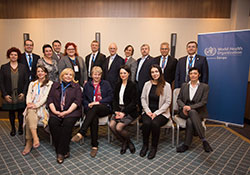Further commitment of south-eastern Europe countries to noncommunicable disease prevention and control voiced in Chisinau, Republic of Moldova

WHO/ Igor Vrabie
A pre-forum meeting on the prevention and control of noncommunicable disease (NCD) was held on 2 April 2017, in Chisinau, Republic of Moldova, in advance of the fourth South-eastern Europe Health Ministerial Forum. The Forum, which took place on 3–4 April, focused on bringing health ministers together to discuss pathways to closer partnership, under the theme ‘Health, well-being and prosperity in south-eastern Europe by 2030 in the context of the 2030 Agenda for Sustainable Development’.
The event involved the national health coordinators and the national focal points on NCD prevention and control in the Member States of the South-eastern Europe Health Network (SEEHN) and was attended by WHO experts. The meeting aimed to assess progress made by the SEEHN countries in the implementation of the national commitments included in the United Nations General Assembly 2014 Outcome Document and the 2011 Political Declaration.
In her opening remarks, Deputy Minister of Health of the Republic of Moldova, Aliona Serbulenco highlighted the need for cooperation: “Over 15 years, the South-eastern European Health Network has demonstrated the benefits of cross-country cooperation in public health by providing a platform to identify and address common challenges. With regard to prevention and control of NCD, efficient strategies are needed and urgent measures should be taken to control risk factors like tobacco, alcohol, obesity, blood pressure, diet and physical inactivity. The Republic of Moldova has endorsed a comprehensive tobacco control law and now is working on strengthening alcohol control measures. Many efforts are done at the primary health care level to improve early detection and management of NCDs”.
Progress made by south-eastern European countries in the fight against noncommunicable diseases
The SEEHN countries – Albania, Bosnia and Herzegovina, Bulgaria, Israel, Montenegro, the Republic of Moldova, Romania, Serbia and The former Yugoslav Republic of Macedonia – have demonstrated considerable progress in tackling NCDs. One of the important achievements is the recent adoption of new or revision of old NCD strategies and action plans by the majority of these countries. They have also demonstrated remarkable improvements in the implementation of tools for NCD surveillance and management, such as cancer registries, cancer screening and primary care-based interventions. Innovative approaches to tackling NCDs have been identified and were presented during the meeting. For example, it was highlighted that the area of NCD prevention can be further improved by considering the use of emerging evidence-based tools such as fiscal policies, better labeling, and marketing controls. All countries demonstrated a significant interest in moving forward in the areas of commercial determinants of health, health workforce, surveillance, and monitoring and evaluation, using an intersectoral approach.
Major health gains achieved through working together
Established as an intergovernmental initiative for regional cooperation in 2001, SEEHN has shown that the health sector contributes to reconciliation, peace and stability in a post-conflict environment. Its members share a vision of promoting health as an integral part of economic development. In addition to participating in intercountry initiatives, each country is investing in health and generating results that inform other Network members.
The WHO Regional Office for Europe, through its base in Copenhagen, and the European Office for the Prevention and Control of Noncommunicable Diseases, based in Moscow, Russian Federation, provide comprehensive support to Member States within the Network for their work on achieving NCD targets.



